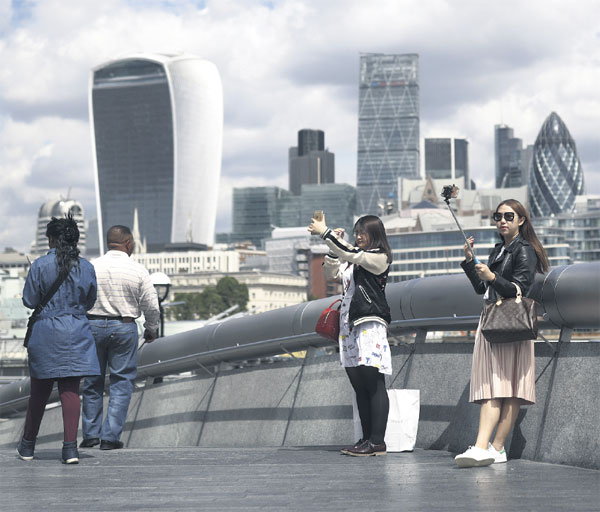UK companies are heartened by Xi's report
They are gearing up to strengthen investment as opportunities beckon
Shareholders in UK-based Imagination Technologies have approved the company being taken over by Chinese-backed Canyon Bridge investment fund.
The $730 million (629 million euros; £555 million) acquisition of the chip designer is the latest in a series of recent high-profile Chinese investments in the United Kingdom.
Other big purchases include the acquisitions of London skyscrapers 20 Fenchurch Street, nicknamed the Walkie Talkie, for $1.7 billion and The Leadenhall Building, known as the Cheesegrater, for $1.57 billion.
|
Tourists take 'selfie' photographs as skyscrapers including 20 Fenchurch Street, also known as the Walkie Talkie, stand beyond, in London. Simon Dawson / Bloomberg |
The Chinese embassy estimates that Chinese nonfinancial investment in the UK last year amounted to $18 billion, while the Confederation of British Industry estimates that British direct investment in China totaled $5.24 billion.
Critics have suggested that China made it difficult for foreign companies to invest in China in the past, but at the 19th National Congress of the Communist Party of China, General Secretary Xi Jinping proposed a series of measures to increase opportunities for foreign investment in the country.
British companies and organizations are gearing up to strengthen investment and trade links, especially in areas highlighted in Xi's report as the country's development focus and direction.
In particular, British businesses in sectors including financial services, city planning, medical and life science, research and development, and high technology have expressed confidence about growing in China, leveraging on British strength, to help China develop the "modernized economy" outlined in Xi's vision.
In his report, Xi, who also is president, outlined China's commitment to continued supply-side structural reform and urged the country to increase efforts to promote better quality, higher efficiency and more robust drivers of economic growth.
Xi also called for boosted factory productivity and accelerating the building of an industrial system that promotes coordinated development of the real economy, with technological innovation, modern finance and human resources, and to set out clear modernization targets for the country by 2020 and 2035.
"This is, of course, a welcome continuation of support for the reforms introduced in the 13th Five-Year Plan (2016-20) and the role of technology innovation in driving continued economic growth," says Chris Rudd, provost of University of Nottingham Ningbo China.
China's commitment to combat pollution and create more ecological and friendly living spaces for its citizens also encouraged Britain's urban planning and architecture companies.
"There is space for British architecture design companies to do more in China, in urban design, smart cities and landscape architecture," says Yang Wei, the founder of a London architecture company.
In the financial services sector, Xi highlighted China's commitment to continue to open its financial markets to foreign companies, deepen China's reforms of its financial systems, introduce more market mechanisms in the setting of exchange and interest rates, and improve financial-risk control mechanisms.
Yu Zongwen, CEO of the London-based advisory company Shanghai-London Connect, says China's commitment to broaden international financial collaboration is very encouraging news to London's financial services industry and to companies involved in capital markets, asset management, insurance and pensions, banking, green finance and financial technology.
"While Brexit creates some uncertainty, it may also allow a deeper and closer economic relationship between China and the UK," Yu says.

























